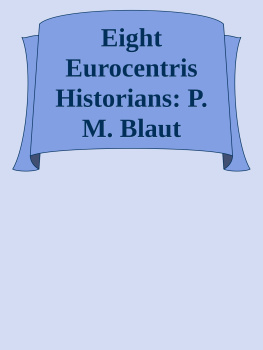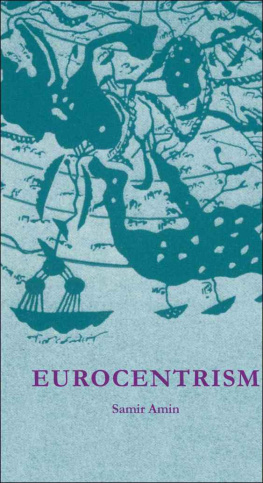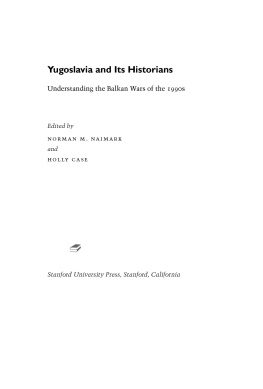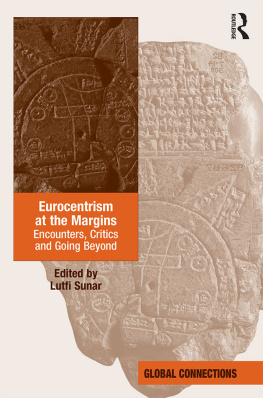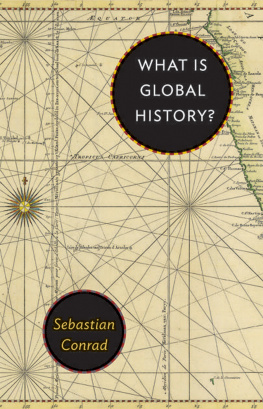CHAPTER 1: Eurocentric History
By my reckoning four kinds of Eurocentric theory have been advanced to explain the fact that Europe (or the West) grew richer and more powerful than all other societies. The four are:
- Religion: Europeans (Christians) worship the True God and He guides them forward through history.
- Race: White people have an inherited superiority over the people of other races.
- Environment: The natural environment of Europe is superior to all others.
- Culture: Europeans, long ago, invented a culture that is uniquely progressive and innovative.
These doctrines have been used in various combinations. Early in the nineteenth century the religious doctrine was prominent, but historians had no hesitation about invoking race, environment, and culture as God's instruments. Later, overtly religious explanations became unpopular, and Europe's superiority was then attributed mainly to race, culture, and environment. Now racism has been rejected, and Eurocentric history stands today on just the two legs: environment and culture. Europe, we are told, rose and conquered the world because its environment and its culture are superior: they caused Europe to develop faster and further than every other society.
All of this, I argue, is wrong: it is false history and bad geography. Europe's environment is not better than the environments of other places--not more fruitful, more comfortable, more suitable for communication and trade, and the rest. Europe's culture did not, historically, have superior traits, traits that would lead to more rapid progress than that achieved by other societies: individual traits like inventiveness, innovativeness, ambitiousness, ethical behavior, etc.; collective traits like the family, the market, the city. The rise of Europe cannot be explained in this Eurocentric way.
I believe that the rise of Europe--that is, the surging of Europe past other civilizations in wealth and power--did not begin until 1492, and resulted not from any unique preexisting internal qualities but from Europe's location on the globe: Europe had immeasurably greater access to the riches of the New World than did any other Old World civilization.
This argument was advanced in the predecessor to this book, The Colonizer's Model of the World: Geographical Diffusionism and Eurocentric History , and I will summarize the argument in a later section of this chapter.
Eurocentric world history is more than a theory: it is a vast complex of beliefs, a world model, made up of countless statements of fact and explanatory theories. These are connected up in a very loose and incomplete network of arguments. Some of the arguments are tied to good evidence, some to poor evidence, some to no evidence at all (often they are inherited folk myths); some arguments are validated by others and some float free. The most highly structured arguments are the written narratives presented by individual historians, and these are what we will look at in this volume.
When a scholar writes about world history or some major part or aspect of it, he or she naturally wants to connect up the various statements of fact and theories so that they form a coherent and plausible argument. Typically, today, the narrative, if it is Eurocentric, is made up of a great number of strikingly diverse arguments: European superiority or priority in everything from climate and topography to demography, technology, state, family, and mentality. My task in this book is to look at narratives of this sort that are put forward by eight important Eurocentric historians.
A work that examines sequentially the writings of eight scholars who put forward Eurocentric views of world history will inevitably have a certain amount of duplication, since these scholars employ many of the same arguments; indeed, this commonality is one of the key generalizations to be made about the school as a whole in the concluding chapter. But the eight historians present differing forms and variants of these common arguments and theories (for instance, Mathusianism, Oriental Despotism, European "rationality"), and this calls for somewhat different responses and citations in each case. I will therefore have to deal with some of the formulations more than once. But repetition will be kept to the minimum, and mostly will be avoided by referring to prior discussions of each argument.
EUROCENTRIC DIFFUSIONI5M
This book builds upon the arguments of Volume 1, and perhaps it will be useful to some readers if I very briefly review two of the principal arguments presented in the prior work: the nature and history of the world model that can be called "Eurocentric diffusionism" and the skeleton of a non-Eurocentric theory about colonialism and the rise of Europe. "Eurocentrism" is a term that was coined fairly recently to indicate a subspecies of ethnocentrism. The latter word in its most common usage means thinking or action or discourse that is "centered" on one ethnic community and falsely claims for that community a superiority, in worth or characteristics, over other communities or the rest of the world. I use the term "Eurocentrism," then, to indicate false claims by Europeans that their society or region is, or was in the past, or always has been and always will be, superior to other societies or regions. The key word here is "false." It is not Eurocentric to prefer European music to other music, or European cuisine to other cuisine. It is Eurocentric to make the claim that Europeans are more inventive, innovative, progressive, noble, courageous, and so on, than every other group of people; or that Europe as a place has a more healthy, productive, stimulating environment than other places. It is not Eurocentric to extol "England's green and pleasant land," but it is Eurocentric to claim that this land is greener and more pleasant than all the other lands of the world.
Eurocentrism has been around since early medieval times, when Europe as a place began to take form in the minds of the community that inhabited it. The community in those times was generally thought of as Christendom, not Europe per se. Christendom was thought to be superior to all other societies because Christians worshipped the True God and therefore they, and their community, and their region on earth must naturally come under His protection. But medieval Christians knew that their civilization was not superior, in terms of wealth, technology, and most institutions, to their Islamic neighbors to the south and east. Europeans--Christians--were superior to everyone else in the most important way of all: they had the greater hope of being admitted to heaven.
Modern Eurocentrism really began in 1492. When Columbus returned from his first voyage to America, he described a people who were heathens, and who, he believed, could be conquered easily. Moreover, the conquest of their land would provide gold and other wealth to Europeans. It seemed clear that Europeans were superior to these Americans and would profit from this superiority. The conquest did indeed prove fairly rapid (mainly because the American populations were decimated by introduced Eastern Hemisphere disease), and the profits were indeed immense. Europeans could now, for the first time on a significantly large scale, make a clear distinction between themselves and a non-European people to whom they could really believe themselves to be superior. The Eurocentrism that thus emerged in the sixteenth century had two essential characteristics: superiority seemed to be confirmed by the success of colonialism; and superiority produced great profits.
Colonialism proved even more successful in later centuries, eventually reaching the level where Europeans were able to conquer and rule not only the Americas but also most of Asia and Africa. And European endeavors in all of these continents continued to be hugely profitable. So Eurocentric beliefs seemed to be continually confirmed as both true and useful, and they gradually evolved into the Eurocentric world-model of modern times. When this model was fully developed, in the nineteenth century, it comprehended a conception of the history and geography of the entire world. And it became the mirror in which Europeans came to see themselves and their own past.

